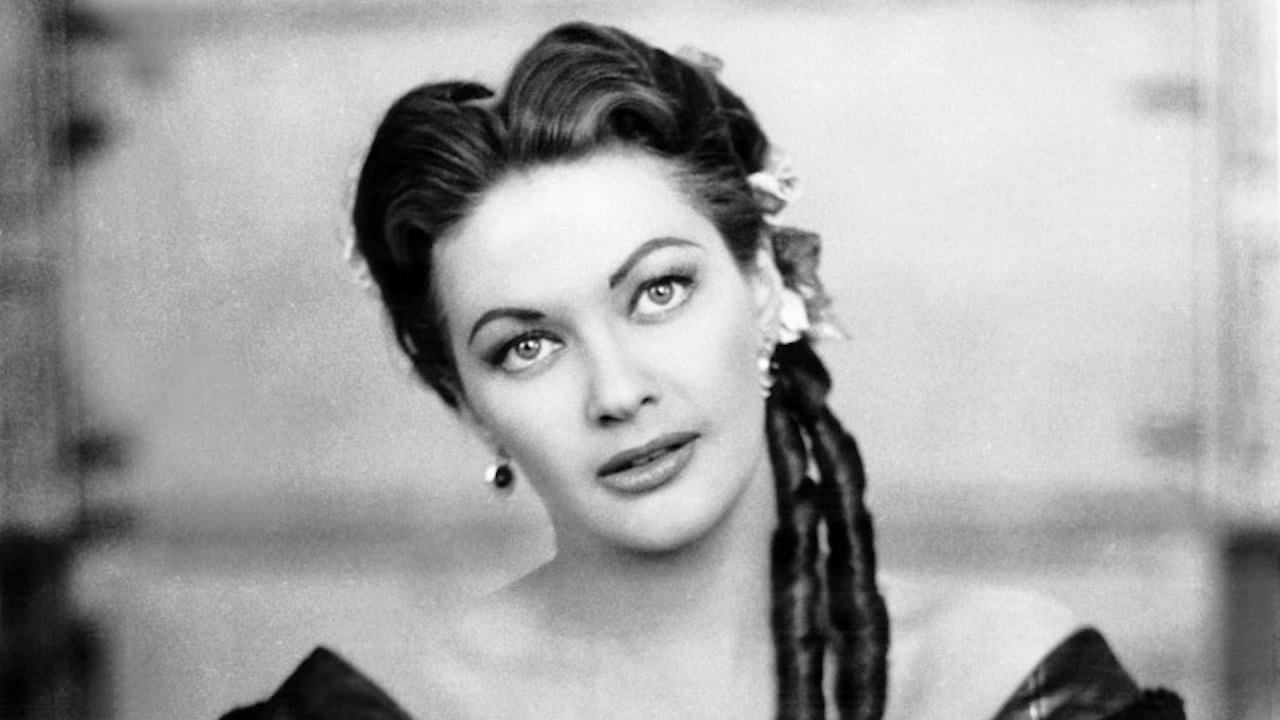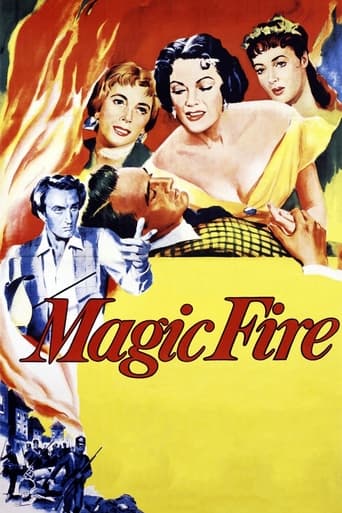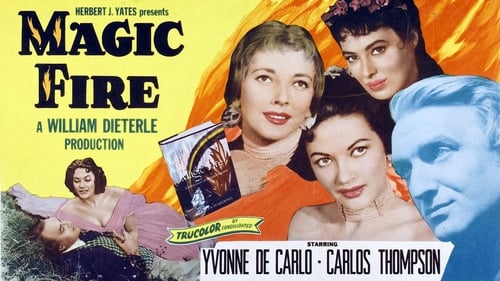


Such a frustrating disappointment
... View MoreMemorable, crazy movie
... View MoreLack of good storyline.
... View MoreBrilliant and touching
... View MoreTo understand all the things that are wrong with this film (and why they are so) requires locating the film soundtrack on LP (only issued more than a quarter-century after the film itself) and reading the stupendously informative cover notes by the son of the film's music director Erich Wolfgang Korngold. Others have commented on the disjointedness and episodic nature of what they have seen, but may not realize that the film was made at a huge cost by Republic, which had assets frozen in Europe that could only be spent there, and so decided to make an all-out spectacular movie that no one in their right mind could ever have expected from the studio so associated with Serials, Westerns and John Wayne. They hired one of the best directors in the business, Wiliam Dieterle, then the (arguably) leading film composer of his time, Korngold, to make a cohesive whole of the musical excerpts seen and heard and the Wagnerian leitmotifs used for the film score itself, and finally some quite first rate actors for the leading roles. The problem is, the finished film ran almost double the length of the issued one, and what we can no longer see are all the scenes that almost certainly caused the film to seem so disjointed and episodic. At its original length, a film on an opera composer could not find first-run bookings, then distributors fought each cut version for further emasculation, the result being that well over an hour was cut from a film that eventually ran about 92 minutes. There are only about six or seven minutes of Wagner's music heard in the entire film, and even those have been bowdlerized into something somewhat unrecognizable even to Wagnerites (I should know, having been one for about 65 years now). I saw this movie originally around 1957 or 1958 as the bottom half of a double-bill at a 42nd Street grindhouse (this when 42nd Street between 7th and 8th Avenues was not a place for the faint-of-heart, and certainly not for films about opera), and at the time I had never even heard of the film, so I imagine it had no opening of note in New York City (maybe no "opening" at all). I thought it dull then, and anyone who wasn't enamored of Wagner must have found it downright stultifying. Upon learning the reasons for my dissatisfaction a quarter-century later with those LP notes, I wanted to see it again, and now finally have. What remains is semi-terrific for the most part, but what is not there will destroy any enjoyment of the film for those not "in the know". We find Wagner claiming that his opera "Rienzi" will make his name. It did, but not in this film, where it is never mentioned again and in which the next scene takes place with Wagner in debtor's prison! We find no indication of his first wife's growing instability (close to madness). When he falls in love and runs off with Cosima, the wife of one of his most fervent supporters, the conductor Hans von Bulow (she is also the daughter of his lifelong friend and supporter Franz Liszt), we see them living together, then much later on married, but no mention is made of their four children, three of whom were born before the Bulows divorced, nor that Bulow remained a steadfast advocate of Wagner for the remainder of his life. Mad King Ludwig doesn't seem very mad at all, and less interesting for not being so. We find Wagner getting an idea for an opera and seemingly accomplishing its writing in a few weeks, while we know that MEISTERSINGER, TRISTAN UND ISOLDE, and THE RING OF THE NIBELUNGS gestated for years, even decades, the last-named consuming some 20 years of the composer's life. The performances are excellent. It's hard to imagine a more visually and dramatically perfect Wagner than Alan Badel (except that he was of fairly normal height, and Wagner was 5' 1"), far better than in his introductory John the Baptist in "Salome" three years earlier. Carlos Thompson is marvelous as the older Liszt (he should have had a better career than he did). Yvonne De Carlo is pretty good as the composer's first wife, catching rather well her essential commonness of character compared with the rather overwhelmingly characterful Richard Wagner (who was arguably the greatest artistic genius, musical or otherwise, of the entire 19th century), and Rita Gam has the best moments of her entire film career as the rather dauntingly intelligent Cosima, a worthy companion for her lover/husband. That she is about 250 times better looking than the original Cosima need not concern us here. Anyway, knowing the film's troubled post-production background has made me much more appreciative of what is left to see (all of which is visually gorgeous and expensive looking). The tragedy of the film is that you can plug in the holes to a large extent, admire all aspects of the production, and then realize what a terrific film was probably left on the cutting room floor.
... View MoreTo film industry, Richard Wagner, an emblematic German composer of the 19th century, is rather known as a supporting character (the most memorable portrayal being the one by Trevor Howard in Visconti's LUDWIG). The film by William Dieterle (a name already known for THE LIFE OF EMIL ZOLA, THE HUNCHBACK OF NOTRE DAME with Laughton), MAGIC FIRE, called by some "choppy and episodic" puts the composer in the lead though being no biopic. And as soon as this far whilst reviewing such a film, we have to keep in mind the very period of its filming. Otherwise, an expectation appears: if it is a movie about a composer, we foresee something unconventional, something intriguing, neurotic, perhaps a but shocking and vibrant...but, that would be a product in the mode of Milos Forman's AMADEUS made 30 years later but never in the morally ordered, explicit films in the mode of 'school lesson' from the post-war period. From the very opening shots, we do not need very learned viewers to predict it is far from 'a radiant stronghold of film art,' far from a faithful biopic, far from a thought provoking interpretation and yet, being an open minded viewer, one may find some strengths in Dieterle's film. Where do these strengths lie? Firstly, it is in the entire visual aspect. Although the film cannot boast such a perfect digital restoration as some other products of its time, it offers images hard to skip. Exceptional subtlety in images, skillful handling of cinematography by Ernest Haller, some camera frames and elaborate costumes with splendid shots of idyllic nature may equal to most aesthetic screen experiences. Note, for instance, the scenes between Richard Wagner (Alan Badel) and Mathilde (Valentina Cortese), one being among the deleted scenes added to the disc as a bonus material. The glamor of palaces and elaborate interiors supply viewers with visual aestheticism. Great credit to art director Robert Herlth.Secondly, it is the educational use of Wagner's operas throughout. While the episodic character of the movie where the action takes place in different cities of Europe (including Zuerich, Dresden, Venice and Paris) and the stories would perfectly affect the portmanteau concept, the stage scenes with the performances of Walkuere, Siegfried, Tannhaeuser, and other great works of the composer help viewers, at least, get to know the most significant masterpieces of our protagonist. In that respect, a note must be made of Erich Wolfgang Korngold and his significant contribution to the music in the film.Thirdly, the film reached for the stars in one aspect: some performances. Here, however, in accordance with another title of the movie, we have our protagonist Richard Wagner played by Alan Badel and three women he loves: Minna Planer, his wife (Yvonne DeCarlo), Cosima (Rita Gam), and Mathide (Valentina Cortese). In addition, there is one man, the famous composer Franz Liszt played by Carlos Thompson. While women appear to evoke jealousy at love, the composer evokes jealousy at work (the creative conflicts are much more effectively developed in LUST FOR LIFE, another film of the 1950s but about a painter, not a musician). All the tensions, however, appear pale and flat. Alan Badel portrays Wagner quite well but, indeed, there is nothing special about him either. Seemingly identifying with Mozart and Beethoven (as he mentions quite often), the viewer could have got a clearer perception of his genius. Yet, his goes flat too seriously. One performance stands on its own and appears to be highly underrated...it is Valentina Cortese's. She does not only look beautiful in the role wearing splendid costumes but combines all features that any composer and anyone would easily fall in love with. Pity she is given so little time on screen and some scenes with her are, as I have already mentioned, deleted.And king Ludwig? As the film is not at all any historical or biographical aid and the figure is in the shadow of the composer (which puts in contrast the historical backbone presence of the composer in the king's life) Riedmann's portrayal will always remain pale and incomparable to the king's later screen incarnates...just an episodic performance, indeed.I consider this film one among ordinary works which only tries to reach for the stars, no magic fire within viewing experience. Nevertheless, a production you can hardly tire of as well.
... View MoreThis was an extraordinarily difficult production, one featuring full-color, on-site locations, staged opera performances, a ballet, large parties where music was featured, rooms in palaces, street scenes and more. Moreover, anyone who does not put the charismatic career of Richard Wagner into the context of the 1848 revolutions and beyond seems fated to misunderstand the revolution parallel to the political unrest that creative artists--Liszt, Wagner and so many others--lived through in Europe. The biography may not be perfect but it is based on Bertita Harding's well-written "Scenes about the life of Richard Wagner"; so as with "Young Bess" one might expect, as is true, that such a fictionalized biography would be far more interesting than the life at some places (see also "The Great Ziegfield", "The Glenn Miller Story"). The film was directed by the great William Dieterle, and it is an undeniable masterpiece in many ways, with stunningly beautiful scenes, rich colors and intelligent acting (he was a Wagnerophile of course). The narrative takes young rebellious and ambitious Wagner from his youth trying to start as a composer to his death in Bayreuth, noted by the world. In between we see Wagner (Alan Badel) in many guises--as rebel, husband, ardent pursuer, jailed pauper, aspiring champion of a new music for a new Age, conductor, hero, exile, composer, friend and more. His first wife wants him to conduct a choir and live quietly with her and his Newfoundland, Robber (pretty Yvonne de Carlo); the woman who champions him (lovely Valentina Cortese) must give him up since she is the wife of a jealous man (Peter Cushing); and his second wife Cosima Liszt, daughter of Franz Liszt (Carlos Thompson) played at award-level by gorgeous Rita Gam, makes him an idol and devotes her life to him, even going against her father who has now taken holy vows. At the end, Wagner's individualism turns into the usual mysticism--he, a sybarite, advocates renunciation--but the real story lies in the sensitivity and intelligence of the man who challenged the music world's doltish "old gods" and forced them to adopt leitmotifs--meaningful themes--in place of long-winded musical tylenol pieces heavy in chromatics and lacking a central purpose. The bright script, filled with good short dialogue scenes, was the work of David Chantler and Ewald Andre Dupont. In the cast besides the principals are Gerhard Riedmann as touching Ludwig the Mad, Erik Schuman as Hans Von Bulow, powerful Frederick Valk, Charles Regnier, Robert Freitag and many other European actors. This is a different age, an age of monarchs, power-struggles and formal music, formal costume, formal manners. Artists then needed a patron--and this was Wagner's problem and his ultimate personal challenge; he resented the need for such a being, and found himself comfortable pursuing the position and the material goods accompanying it. He was impossible and kind, honest and in denial, hard-working and vain; but unlike most central characters, he was worth making an attractive film about. Ernest Haller provided cinematography; the many costumes were the work of Ursula Maes. Robert Herith did fine and consistent art direction. In the central role, Alan Badel is often good and he understood the character of Wagner very well. Cortese, Valk and Regnier are very good; and Carlos Thompson very powerful as Franz Liszt. This is a lovely film, miles above almost anything else like it . To its attractions, we owe the few films about serious musical artists that followed it. A ground-breaking effort.
... View MoreOne of the few films made with production care (but alas, not accuracy) at Republic in their final years, this is a very clumsy attempt at classy film making because of the wrong casting and silly storyline. The furniture and photography are good though. Supposed to be the story of Richard Wagner, it looks like a Monty Python version of The Music Lovers. Yvonne de Carlo was soon to be Lily Munster and Alan Badel must have been practising his bad German accent for 1979's Riddle Of The Sands long before it was needed. The problem with films like this is that real music lovers know and knew (in 1956 too) what Wagner was all about and how his music should be presented. This is very much a Liberace idea of European music and life. It's not even funny. It died, too. It actually is as if Republic, so used to making westerns just applied euro music and settings and then went about making a western anyway, it just happened to be the 'life story' of composer Wagner. Equally odd is the fact that the much lampooned wife of studio head Vera Ralston, with her thick euro accent SHOULD have been in this film instead of Yvonne, but wasn't.....
... View More